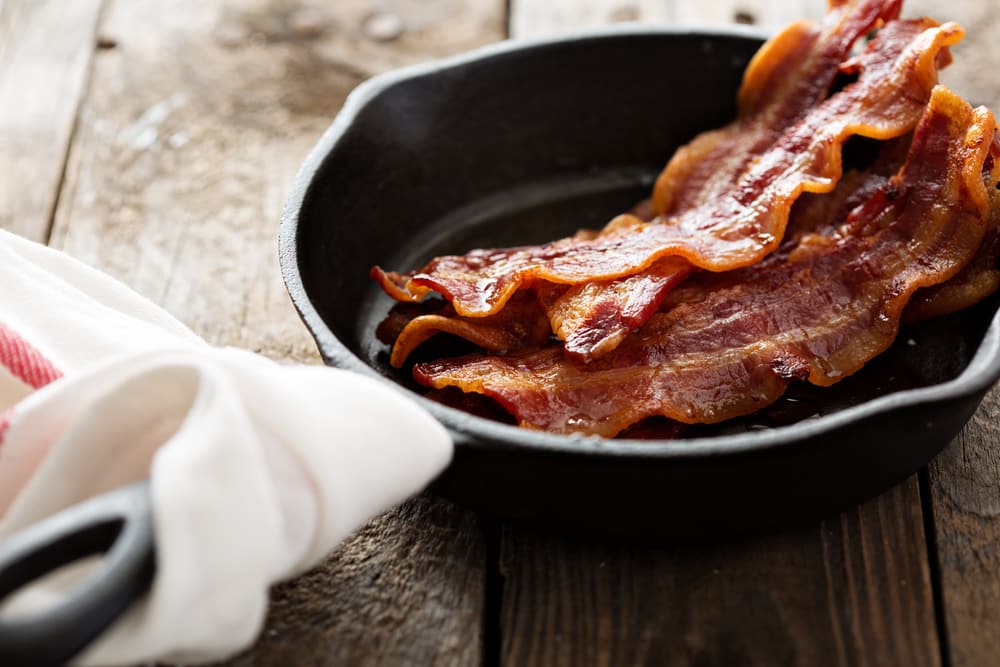
Bacon is arguably one of the most popular dishes that people like to use in their diet. There are quite a few methods that you can use to prepare the bacon for consumption. While some people like to smoke their bacon, others rely on their grill system to manage their recipe. So, you are not limited by the number of cooking methods that can be used to prepare bacon for a meal.
With that said, a common question that people ask is why bacon is so salty. If you’re also confused about the same thing and don’t know how to manage the saltiness of the bacon, the following information should help.
Why Is Bacon So Salty?
1. Curing Process
The majority of bacon available in the market is cured with the use of saltwater. This method substantially increases the life span of the bacon, but it also introduces an intense salty flavor to your recipe. When the bacon is cured with salt water or brine, the salty flavor gets absorbed into the meat. This process also adds moisture to the bacon along with the salt. So, when you cook the bacon, the moisture in the bacon is removed slowly from the pan, and all you’re left with is a salty piece of bacon.
There is not much that you can do about this curing process. You have to change the sourcing of the bacon and expand your budget for more expensive alternatives. The best thing you can do about this issue is to purchase fresh pork from a reliable supplier. That way, you won’t have to worry as much about dealing with the salty flavor of the recipe.
With that said, most people have also pointed out that the dry-cured bacon is less salty than the brine-cured bacon. So, depending upon your budget, you can go for either option to pick a less salty alternative for your recipe.
2. Cooking Method
Aside from the curing process, the cooking method can also play a huge role in determining the saltiness of your bacon recipe. Cooking bacon in the pan for a longer period evaporates all the moisture from the meat. This reduces the size of the bacon strip and also leaves behind an excess number of salts on the bacon. So, when you eat the bacon, each bite tastes saltier than the previous one.
So, even if you have bought bacon cured with brine, you can easily modify the cooking method to reduce the salty flavor of the meat. Even though the overall salt content will remain the same, cooking bacon for a shorter period would allow you to manage the saltiness of this meat better. This is why you will often notice people minimize the amount of time bacon stays on the pan.
On the other hand, if you don’t like to eat bacon with some traces of moisture in it, then you can add other ingredients to the pan to balance out the salty flavor. All in all, you can control the salty flavor of the bacon if you’re experienced enough with the cooking methods.
3. Quality of Bacon
Aside from the cooking method and the curing process, you also have to put extensive focus on purchasing high-quality bacon from the market. Poor quality bacon brings a more intense salty flavor to your recipe. So, instead of saving some bucks on a slab of bacon, you should try to extend your budget and purchase high-quality bacon from the market. This will help you overcome the issues with the salty flavor of the bacon.
All in all, these were a few reasons why your bacon is salty and how you can go about managing the salt content in the bacon. In the end, it all boils down to the quality of bacon you’re purchasing from the market and how you’re cooking it. Saving some money does seem like a good option in the short run, but you will have to deal with the unrefined flavor of the recipe for the rest of your meals.
This is why you should try to find high-quality bacon that is dry-cured and not treated with brine. That way, the moisture and the salt content inside bacon will be comparatively less. Hopefully, this information helps you maintain the quality of your dishes.